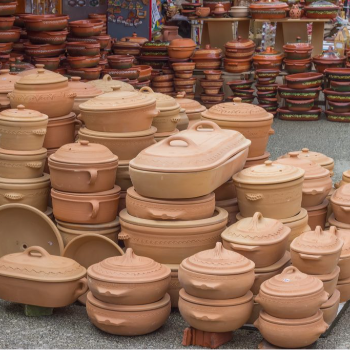In the bustling city of Mumbai, where skyscrapers touch the clouds and traditions weave through everyday life, a new trend is quietly making waves in urban kitchens. Meet Anjali, a young, environmentally conscious professional who is determined to live a sustainable life while keeping her cultural roots intact. Her journey led her to discover a unique blend of the past and the future—eco-friendly clay utensils.
Anjali's story is not just hers alone; it's a narrative that resonates with many urban Indians who are caught in the crossfire of modern living and traditional values. The problem Anjali faced is one that many can relate to the desire to embrace sustainability without compromising on authenticity and health. For her, the solution came in the form of eco-friendly clay utensils—an innovation that promised to address her practical needs while soothing her emotional longing for tradition.
Clay utensils, a staple in ancient Indian kitchens, are known for their natural and health-promoting properties. Unlike conventional cookware made from metals or plastics, clay pots and pans are free from harmful chemicals. They preserve the natural flavors of food, enhance its nutritional value, and offer a cooking experience that is both wholesome and authentic. For Anjali, switching to clay utensils was a decision fueled by the desire to reduce her carbon footprint and reconnect with her roots.
But Anjali's journey was not just about personal satisfaction. It was also about contributing to a larger cause—environmental sustainability. The production of clay utensils involves minimal use of energy and resources, which significantly reduces their environmental impact. By choosing these eco-friendly alternatives, Anjali was taking a stand against the unsustainable practices associated with traditional kitchenware manufacturing.
For those like Anjali, who are passionate about sustainable living, the emotional fulfillment that comes with using clay utensils is profound. It is a silent nod to the wisdom of our ancestors, an acknowledgment of the earth's resources, and a step toward preserving the environment for future generations.
Consider the story of Rajesh, an environmental activist from Chennai. He started a community initiative to promote clay utensils in local households. His campaign highlighted not only the environmental benefits but also the health advantages of cooking in clay. As more families adopted this change, a ripple effect was created—people became more conscious of their choices and their impact on the planet.
The adoption of clay utensils represents a growing movement toward sustainability in India. It's a movement characterized by small, individual choices that collectively contribute to a significant environmental impact. This shift is evident in urban markets where the demand for eco-friendly products is steadily rising. From upscale stores in Delhi to vibrant bazaars in Kolkata, clay utensils are gaining popularity among those who seek a balance between modern convenience and traditional wisdom.
As we navigate the complexities of modern life, the choices we make in our kitchens reflect our values and aspirations. For Anjali, Rajesh, and countless others, eco-friendly clay utensils are more than just kitchen tools; they are symbols of a lifestyle that honors the past and embraces the future.
In conclusion, the rise of clay utensils in urban Indian kitchens is more than a trend—it's a testament to a growing consciousness about our role in preserving the planet. By choosing clay, we are not only reviving an age-old tradition but also paving the way for a sustainable future. So, the next time you step into your kitchen, consider the humble clay pot—not just as a cooking vessel, but as a bridge between the past and the future, between tradition and innovation.
Visit Vyaparify Site:
https://id.vyaparify.com/seaclap-international 
